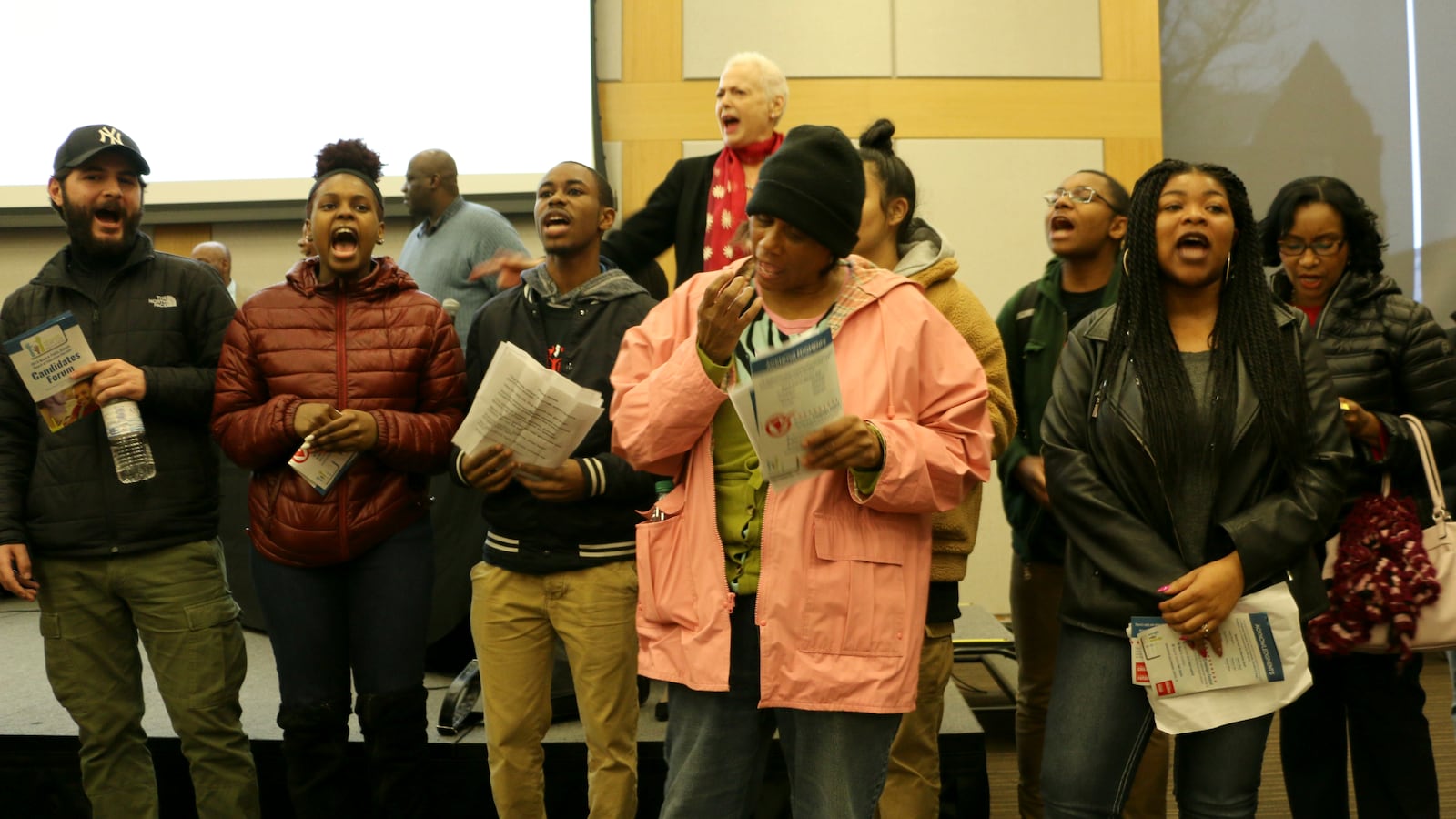The 13 candidates vying for three spots on the Newark school board had just finished introducing themselves at a forum this week when a whistle sounded from the back of the college auditorium.
With that, a column of demonstrators marched down the aisle of the auditorium on Rutgers University-Newark’s campus clapping and chanting, “The whole system is corrupt, public schools don’t have enough.”
It was a sudden jolt to an otherwise sleepy race.
The new members elected on April 17 will join the first nine-member board to have full authority over the city’s schools since 1995, when the state seized control of the Newark school system. And yet, for all its historical significance, this election season has been quieter than in the recent past.
The lower volume is partly due to the departure of state-appointed superintendents whose policies provoked a groundswell of resistance. There is also an alliance between formerly rival factions that now line up behind a single slate of candidates, eliminating some of the bitterness of past races.
Still, as Tuesday’s pop-up protest made clear, an absence of headline-grabbing battles hardly means that everyone now is happy with the schools. Once the demonstrators reached the front of the auditorium, the group of nearly 20 youth and adult activists declared a litany of school problems that they say remain even after the state takeover has ended.
“Even though we fought and won full local control,” the protesters said in unison, “we still face lead in our water, overcrowded classrooms, rotten lunches, laid-off teachers, books falling apart, schools being closed.”
The forum, which was hosted by the Newark Trust for Education, resumed after the flash protest. And while it was less dramatic, the forum also addressed a range of challenges facing New Jersey’s largest school system.
Here are some highlights.
1) The big winners: Parent engagement, community schools, collaboration.
The candidates are a diverse bunch made up of community activists, school workers, parent leaders, and at least one veteran of the U.S. Army Reserve. Yet many of their ideas overlapped.
Proposals echoed by several candidates included: More parent involvement in schools, greater support for students’ social and emotional needs (whether through extra guidance counselors or “community schools” that provide social services), teachers and classroom materials that better reflect students’ cultural backgrounds, and more cooperation — between families and schools, the district and charter sectors, even board members.
“It seems like a lot of times everyone is from a different walk of life where they’re bumping heads,” said Khalil Hannah. “We need to come together and build a consensus.”
2) The big loser: The school-enrollment system.
When the candidates were asked which district policy they would immediately review if elected, there was near-consensus: enrollment.
Called “Newark Enrolls,” the system allows families to use a single online tool to apply to up to eight schools anywhere in the city — including district and charter schools. It grew out of a controversial overhaul in 2013 dubbed “One Newark,” which replaced the tradition of students attending their nearest school with a citywide enrollment lottery.
The overhaul provoked an outcry after many students were sent to schools far from their homes or separated from siblings. Since then, the district has revised its matching algorithm. This school year, 95 percent of incoming kindergarten students and 70 percent of incoming 9th graders received one of their top three choices, according to the district.
But the candidates said on Tuesday that the system remains deeply flawed.
“My major concern is restructuring and revisiting the enrollment,” said Jameel Ibrahim, one of at least 10 candidates to say the city’s enrollment system must be improved or replaced.
While they agreed on the problem, the candidates had much less to say about how they’d fix it.
3) The frontrunners: One slate has a leg up.
The forum mostly avoided an uncomfortable reality of the race: Three candidates have a major advantage.
Yambeli Gomez, Dawn Haynes, and Asia Norton are part of a slate called “Moving Newark Schools Forward,” which is backed by a powerful coalition made up of the mayor, a North Ward councilman, and the charter-school sector. Since the alliance formed in 2016, its candidates have swept each election.
No one mentioned that political arrangement directly on Tuesday, though some appeared to allude to it.
“You want to vote for people who are unbossed, unbought, and unbiased,” Yolanda Johnson said in her closing statement. “You want to vote for people who are not afraid to go up against the powers that be — people who are not entangled or attached to any political agenda.”
For their part, the slate members said little about their shared agenda or how they had won the support of three distinct power centers, each with its own constituents and priorities. Instead, they vowed to work as partners if elected.
“Me, Asia, and Dawn are three different people, and we represent a lot of different points of views,” Gomez said in her closing remarks. “But we’re willing to collaborate and work together because the most important thing is our students.”

